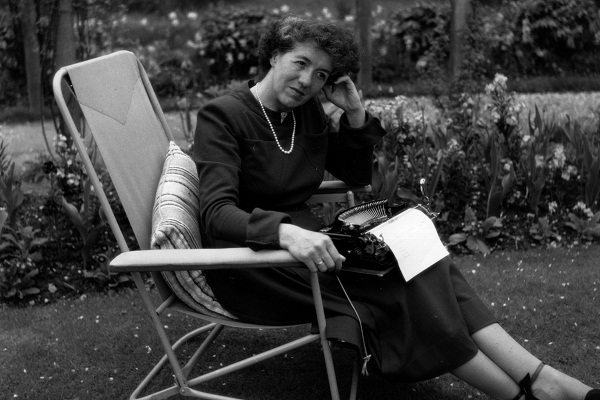‘Write your own name a hundred times,’ T.H. White once commented, ‘and you will be bored; seven hundred times and you will be exasperated; seven thousand times, and your brains will be reeling in your head. Then you realize that you have only written one-tenth of a new novel.’ No surprise that White should display such a familiarity with the mathematics of writing; all authors do. At least the professional ones do – they have to. When your living depends on not missing deadlines, one question looms all the time: how many words are there in a day?
Actually, assuming that White meant a name comprising one forename and one surname, he was making things slightly tougher on himself than he had to. A 140,000-word book (be it a novel or non-fiction) is on the long side – most come out somewhere between 80,000 and 100,000. Of course it’s rare that a writer will have an exact target as they start work on a book, but still you need a rough idea. And given an estimate of x months to finish, you’ll end up with a figure of y words per day to keep you on track. How have various writers defined y? (To help you make sense of the figures that follow, the word count for this paragraph – including this sentence – is 125).
Sebastian Faulks says that he never writes fewer than 1,000 words a day, sometimes reaches 2,000, but usually settles at between 1,400 and 1,500. In this respect, if in no other, he is average. A lot of writers, in my experience, give a figure somewhere in this region, and it seems to be my modus scribendi as well. Nice to know that Faulks may be a better writer than me, and sell more copies, but that his work rate is roughly the same. What’s really irritating, though, is that sometimes he doesn’t get inspired until 5pm, ‘when a 1,000 words can come in 20 minutes’. Jammy sod. And to think I used to get jealous of Bill Deedes, who prided himself on being able to produce 1,000 words in 100 minutes.
Down near the bottom of the ‘give us this day our daily wordcount’ table are Ernest Hemingway and Graham Greene. Both limited themselves to 500, stopping at 501 no matter how inspired they were. For Papa it meant being able to concentrate on quality as well as quantity (crucial, of course – it’s so easy to slip into the trap of being a word whore). Hemingway rewrote the last page of Farewell to Arms 39 times. ‘Was there some technical problem there?’ asked an interviewer. ‘What was it that had stumped you?’ Hemingway replied: ‘Getting the words right.’ Greene, meanwhile, tailed off even further as he aged, and by his sixties was down to 300 words a day. I’d always assumed that authors from that pre-word-processor age just estimated their count (in fact many quantified their output in pages rather than words) – but Greene was exact. He put an ‘x’ after each section of 300 words. How did he know? Was the counting itself part of his ritual?
Moving to the 1,000 level, we reach the elderly P.G.Wodehouse (down from 2,500 in his youth), Tracy Chevalier and J.G.Ballard (‘even if I’ve got a hangover’). Ballard was another one for the ‘stopping in the middle of a sentence’ trick, while Philip Pullman, an 1,100 man, always writes the first sentence of the next page ‘so I never have a blank page facing me in the morning’. His other secret is (or certainly was) stopping in the middle of the day to watch Neighbours: ‘invaluable’. Those up at 2,000 include Charles Dickens, Stephen King (he recommends that would-be novelists start at 1,000 per day, 6 days a week) and James Thurber, whose relatively high count was all the more impressive because bad eyesight forced him to compose in his head during the morning, then dictate to a secretary in the afternoon. On the odd occasion he did actually write himself it was in black crayon on yellow paper, ‘getting perhaps twenty words to the page’. Alec Waugh did a daily 2,000, except when he took Benzedrine and managed 24,000 in a week, none of them any good. W.H. Auden, on the other hand, took Benzedrine every morning for 20 years, calling it a ‘labor-saving device’ in the ‘mental kitchen’.
Who’s above average? Anthony Trollope for one, who before he set off for his job at the GPO every day would write 3,000 words between 5.30 and 8.30am. He kept his watch in front of him so he could achieve 250 words each quarter-hour. If he finished one novel before 8.30, he would instantly start the next one, and advised all writers to be as regimented. ‘Let their work be to them as is his common work to the common labourer. No gigantic efforts will then be necessary. He need tie no wet towels round his brow, nor sit for thirty hours at his desk without moving.’ Iain Banks achieves the same 3,000 count – though in his case the trick is listening to Radio 1.
Enid Blyton was a real high-flier, with a 6,000-a-day habit. The record, though, as far as I can tell, goes to John Fowles. During the writing of his first novel, The Collector, he produced 10,000 words a day. However much editing they required afterwards, that’s still an amazing figure.
Perhaps it’s easier to cheat. You could emulate Percival Lowell, the renowned astronomer who once received a telegram from the newspaper magnate William Randolph Hearst asking: ‘Is there life on Mars? Please cable one thousand words.’ Lowell responded with ‘Nobody knows’ repeated 500 times.






Comments